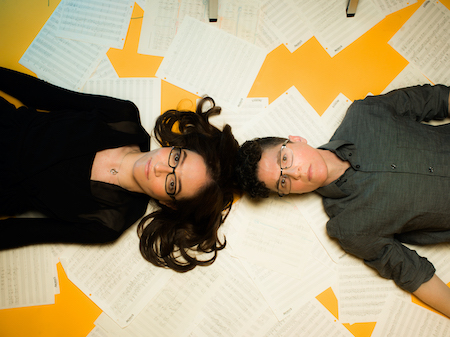Jan 13, 2026 2:09 PM
More Trump-Kennedy Center Cancellations
The fallout from the renaming of the John F. Kennedy Center for the Performing Arts to include President Donald…

A new breed of New York-based contemporary jazz composers that includes Erica Seguine (left) and Shon Baker is reinventing orchestral music for the 21st century.
(Photo: Desmond White)Unlike the retro swing revival of the 1990s, the current incarnation emerged from conservatories, not bandstands and ballroom dance floors. But it’s drawing enthusiasts to small clubs where young players magically stretch time and space. Who’s in the vanguard? For starters, the Erica Seguine/Shon Baker Orchestra, whose stunning debut is evocatively titled The New Day Bends Light.
“Each composition on this album is an inner world we invite you to immerse yourself in,” the co-founders wrote in a mission statement. It’s a vision they’ve shared since 2011, when they first collaborated for their graduate music department recital at William Paterson University. In the ensuing years, they’ve become key players in New York’s vibrant community of young jazz composers like Secret Society’s Darcy James Argue, who produced their album.
Over a Zoom call, Seguine and Baker logged on from their respective homes in Bushwick, Brooklyn, and Boonton, New Jersey, for a lively conversation. Here are a few highlights.
Cree McCree: “Reel,” the joyous Celtic opener that you wrote, Erica, uses instruments rarely associated with jazz. What’s the backstory on that?
Erica Seguine: Years ago in North Carolina, I met a guy who handcrafts hammered dulcimers in a store called Song of the Wood and fell in love with the instrument. So I started learning some Celtic tunes, studied with a clarinetist who also plays tin whistle and decided to write a reel of my own.
McCree: What makes your music jazz as opposed to modern classical orchestral?
Shon Baker: An improvisational component. It’s composed, but within every piece there’s usually some improv.
Seguine: I’ve never been a huge fan of genre boundaries. But we are very orchestral, and there’s a lot of classical influences as well. And Shon’s music is very cinematic.
McCree: What’s the biggest hurdle big-band jazz composers face?
Seguine: Unfortunately, in the jazz world, people who are primarily composers are also expected to be a performer. In the classical world, you can just be a composer. You don’t have to be the first violinist. That’s one reason I started conducting music: to get my music played. I love conducting music, and I was lucky that I found something that I feel is just as much my calling as composing. Now I get asked to conduct a lot of other big bands. But that’s not the case with everyone. I wish people really respected how much time it takes to write a piece of music. How much beauty there is in that. We don’t ask musicians to compose all the music they play. So why do we ask composers to become professional performers to get their music played? DB

Belá Fleck during an interview with Fredrika Whitfield on CNN.
Jan 13, 2026 2:09 PM
The fallout from the renaming of the John F. Kennedy Center for the Performing Arts to include President Donald…

Peplowski first came to prominence in legacy swing bands, including the final iteration of the Benny Goodman Orchestra, before beginning a solo career in the late 1980s.
Feb 3, 2026 12:10 AM
Ken Peplowski, a clarinetist and tenor saxophonist who straddled the worlds of traditional and modern jazz, died Feb. 2…

The success of Oregon’s first album, 1971’s Music Of Another Present Era, allowed Towner to establish a solo career.
Jan 19, 2026 5:02 PM
Ralph Towner, a guitarist and composer who blended multiple genres, including jazz — and throughout them all remained…

Rico’s Anti-Microbial Instrument Swab
Jan 19, 2026 2:48 PM
With this year’s NAMM Show right around the corner, we can look forward to plenty of new and innovative instruments…

Richie Beirach was particularly renowned for his approach to chromatic harmony, which he used to improvise reharmonizations of originals and standards.
Jan 27, 2026 11:19 AM
Richie Beirach, a pianist and composer who channeled a knowledge of modern classical music into his jazz practice,…